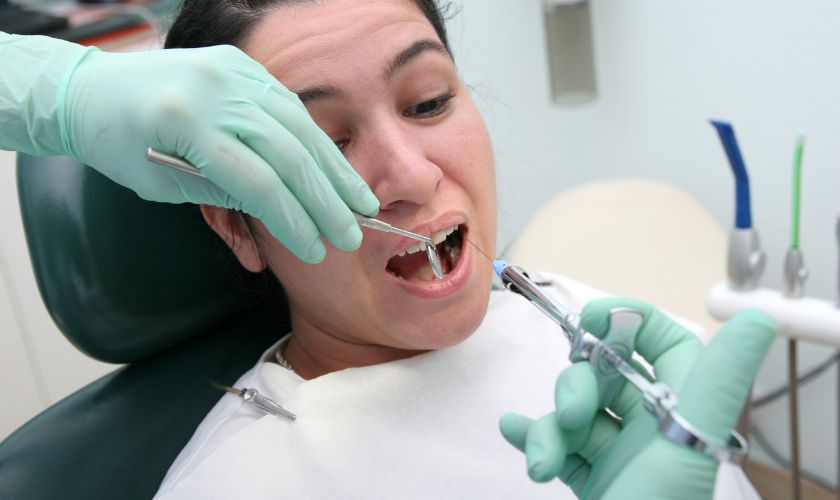(703) 372-5665
7 Simple Tricks for Overcoming Dental Anxiety Forever

7 Simple Tricks for Overcoming Dental Anxiety Forever
Dental anxiety is a common issue that affects countless individuals, preventing them from seeking essential dental care and potentially leading to deteriorating oral health. The good news is that there are practical and effective ways to overcome dental anxiety. In this comprehensive guide, we’ll explore seven simple tricks to help you conquer your fear of the dentist and ensure that your oral health remains a top priority. Say goodbye to dental anxiety forever and embrace a healthier, happier smile.
What Is Dental Anxiety & Why Does It Happen?
Dental anxiety, often referred to as dental phobia, is a prevalent and understandable fear many individuals experience when facing the prospect of visiting the dentist. It typically stems from a combination of factors, including past traumatic dental experiences, fear of pain or discomfort, and the general anxiety that often accompanies healthcare settings. The anticipation of unfamiliar sounds, sensations, or even the mere sight of dental instruments can trigger anxiety. Moreover, feeling helpless while lying in a dental chair can intensify these emotions. It’s essential to recognize that dental anxiety is a legitimate and widespread issue affecting people of all ages. Understanding its root causes is the first step in effectively addressing and overcoming this fear.
How Does Dental Anxiety Affect Your Oral Health?
- Delayed or Avoided Dental Care: Dental anxiety can lead to avoiding routine dental check-ups and necessary treatments, causing oral health issues to escalate.
- Worsening Dental Conditions: Neglected dental problems can worsen over time, leading to more extensive and costly treatments in the future.
- Poor Oral Hygiene: Anxiety can hinder consistent oral hygiene practices, such as regular brushing and flossing, increasing the risk of cavities and gum disease.
- Compromised Overall Health: Oral health is closely linked to overall health. Untreated dental issues can contribute to systemic health problems.
- Emotional Stress: Dental anxiety can cause emotional stress and impact daily life as the fear of dental visits lingers.
7 Effective Strategies To Overcome Dental Anxiety Permanently
Choose a Dentist with Experience in Treating Dental Anxiety
Selecting a dentist with expertise in addressing dental anxiety is a pivotal first step. These practitioners are often called “gentle” or “sedation” dentists. They understand the unique needs of anxious patients and create an atmosphere of empathy and understanding. They are trained to use calming language and techniques that help ease your nerves. These dentists also tend to have more comfortable and inviting office environments, which can contribute to a sense of relaxation even before the treatment begins. By partnering with a dentist who specializes in handling dental anxiety, you can significantly reduce the apprehension associated with dental visits.
Discuss Your Fears with Your Dentist
It is important to communicate with your dentist openly and honestly. Sharing your fears and concerns allows them to tailor their approach to your needs. Dentists aware of your anxiety can adjust their methods, explain procedures in detail, and provide continuous reassurance during treatments. They may even offer to schedule extra time for your appointment, ensuring you never feel rushed or pressured. By building a collaborative and trusting relationship with your dentist, you can work together to make each visit as comfortable as possible.
Explore Sedation Dentistry Options
Sedation dentistry offers a spectrum of sedation levels, from mild relaxation to deep sedation. These options help patients remain calm and anxiety-free throughout their dental procedures. Nitrous oxide, commonly known as “laughing gas,” induces mild relaxation and is inhaled through a mask. Oral sedatives, usually in the form of a pill, provide a deeper state of relaxation but allow you to remain conscious and responsive. For those with severe anxiety, intravenous (IV) sedation or general anesthesia may be appropriate. Your dentist will discuss these options with you to determine the most suitable choice based on your anxiety level and the procedure’s complexity.
Practice Relaxation Techniques
Learning and practicing relaxation techniques can be invaluable for managing and overcome dental anxiety. Relaxation exercises, such as deep breathing, can help calm the nervous system. By taking slow, deep breaths before and during your appointment, you can reduce feelings of panic and tension. Progressive muscle relaxation involves tensing and then relaxing different muscle groups, helping to alleviate physical tension. Mindfulness meditation encourages staying present in the moment, distracting your mind from anxious thoughts. You can practice these techniques at home to build confidence during dental visits, gradually reducing anxiety’s grip on you.
Schedule Shorter, More Frequent Appointments
If extended dental appointments heighten your anxiety, consider breaking down your treatment plan into shorter, more frequent visits. Starting with brief check-ups or less invasive procedures allows you to acclimate to the dental environment and build trust with your dentist over time. As you become more comfortable, you can gradually extend the duration of your appointments. This step-by-step approach helps desensitize you to the dental setting and reduces the fear of prolonged treatments.
Bring a Supportive Companion
Having a trusted friend or family member accompany you to dental appointments can provide valuable emotional support. Their presence can offer a sense of security and reassurance during a challenging experience for you. Your companion can hold your hand, offer encouragement, and engage in distracting conversations to help ease your anxiety. Many dental offices are accommodating and allow a supportive companion to be present during procedures, as long as it doesn’t interfere with the dentist’s work. Sharing the experience with someone you trust can make the process less daunting and isolating.
Reward Yourself for Facing Your Fears
After each dental visit, it’s essential to acknowledge your bravery in confronting your dental anxiety. Reward yourself for taking proactive steps to overcome your fear. The rewards can be as simple as treating yourself to a favorite snack, indulging in a hobby you love, or engaging in a relaxing activity. Positive reinforcement creates a more positive association with dental care, motivating you to seek treatment without fear. Recognize that each successful dental appointment brings you closer to better oral health and a brighter, anxiety-free smile.
Dental anxiety should never stand in the way of maintaining a healthy smile. By implementing these seven simple tricks, you can conquer your fear of the dentist and ensure that your oral health remains a top priority. From choosing a compassionate dentist to exploring sedation dentistry and practicing relaxation techniques, these strategies can help you overcome dental anxiety forever. Don’t let fear hold you back from the smile you deserve; take the first step toward a lifetime of dental wellness.




